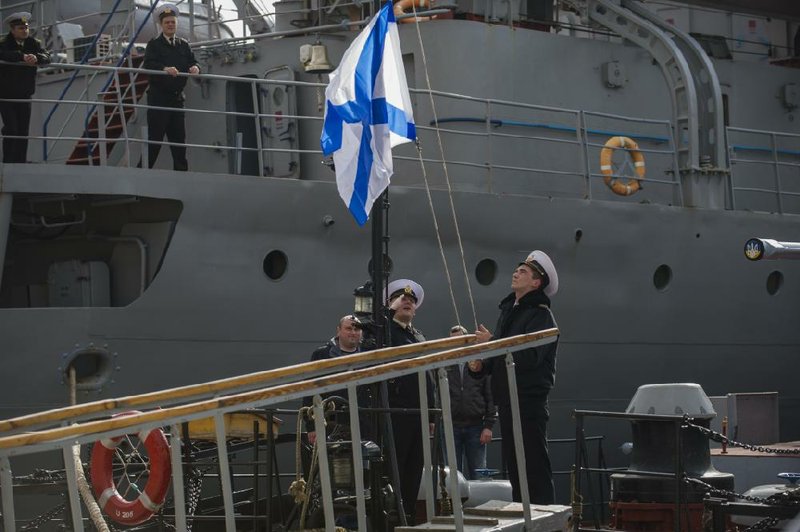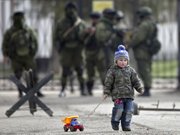WASHINGTON - President Barack Obama on Thursday announced that he would expand sanctions against Russia, blacklisting wealthy individuals with ties to the government and a bank used by them, and opening the door to broader measures against Russian energy exports.
European leaders also announced new sanctions in response to President Vladimir Putin’s move this week to annex the breakaway Ukrainian region of Crimea.
The U.S. measures were aimed at forestalling further Russian incursions into eastern Ukraine, after what Obama described as troubling Russian military movements.
In response, Moscow banned nine U.S. officials from entering Russia, including House Speaker John Boehner of Ohio, Senate Majority Leader Harry Reid of Nevada, Sen. John McCain of Arizona and three senior White House officials.
In a statement accompanying the list, Russia’s Foreign Ministry denounced the U.S. sanctions as a tool “from the arsenal of the past” that would backfire. “There should be no doubt: for every hostile attack, we will respond appropriately,” the statement said.
The Russian action was met with a mixture of bemusement and mild defiance in Washington.
Michael Steel, a spokesman for Boehner, said, “The speaker is proud to be included on a list of those willing to stand against Putin’s aggression.”
Obama made a statement on the South Lawn of the White House on Thursday before leaving on a trip to Florida.
“The United States is today moving, as we said we would, to impose additional costs on Russia,” he said. “These are all choices that the Russian government has made, choices that have been rejected by the international community.”
Obama also said he had signed an executive order that would allow him to impose sanctions on Russian industrial sectors, presumably including its energy exports - a step that would greatly tighten the economic pressure on Russia.
Putin’s spokesman, Dmitry Peskov, denounced the sanctions as unacceptable. But he said one of those on the list, Putin’s chief of staff, Sergei Ivanov, had spent more than 20 years in the KGB’s foreign intelligence service and had already been banned by “a majority of countries in the West.”
“So he is quite accustomed to this situation,” he added.
Ivanov is a close friend and aide to Putin. The two joined the KGB, the main security agency for the Soviet Union, together in 1975. Ivanov, who speaks perfect English and Swedish, is believed to have served undercover in Helsinki and London. He has served beside Putin throughout his presidency and was considered a possible successor when Putin stepped down after two terms in 2008, anointing instead another close aide, Dmitry Medvedev, now the prime minister.
Another Russian singled out, Vladimir Yakunin, the head of the Russian Railways, another close adviser and friend to Putin since they met in St. Petersburg shortly after the collapse of the Soviet Union, said he was being punished for political reasons.
“I’m sorry that a country that calls itself democratic uses sanctions for an honest position and for honest statements,” he told the Interfax news agency.
The U.S. sanctions followed a first round of economic penalties ordered earlier in the week on 11 people who the U.S. said were involved in the dispute in Ukraine.
Russia moved its military into Ukraine’s Crimean Peninsula three weeks ago, and Putin has since signed a treaty to annex the region into its borders. The U.S. has declared Russia’s incursion into Crimea a violation of international law and does not recognize its annexation of the peninsula.
Still, U.S. officials privately acknowledge that Russia is unlikely to give up Crimea. Their top priority is keeping Russia from moving into other areas of Ukraine with pro-Russian populations.
“The world is watching with grave concern as Russia has positioned its military in a way that could lead to further incursions into southern and eastern Ukraine,” Obama said.
The executive order signed by Obama laid the legal groundwork to punish Russian companies involved in the arms trade, as well as other officials who work with the Russian government. The administration is now moving on those fronts as well.
But Obama has ruled out any military intervention in the Ukraine crisis.
“We are not going to begetting into a military excursion in Ukraine,” Obama told NBC news anchorman Mark Mullen on Wednesday night. “What we are going to do is mobilize all of our diplomatic resources to make sure that we’ve got a strong international correlation that sends a clear message.”
The new sanctions were coordinated with a similar response by the European Union, Moscow’s biggest trading partner.
European Union leaders on Thursday hit 12 more people with travel bans and asset freezes; announced plans to scrap a scheduled EU-Russia summit in June; and said the Group of Eight forum of leading economies had been suspended indefinitely.
Russia holds the presidency of the G-8, and Putin was due to host his counterparts, including Obama, at a G-8 summit in Sochi in June.
German Chancellor Angela Merkel said that beyond increasing the number of asset freezes and travel bans - which initially affected 21 politicians and military commanders - the leaders would prepare stronger measures for future use, which would include economic sanctions and an arms embargo.
Also, Ukraine’s Prime Minister Arseniy Yatsenyuk will sign a political agreement with EU leaders today, underscoring Europe’s commitment to the new leadership in Kiev.
TROOPS AT BORDER
The U.S. and European moves appeared to have little immediate effect in Russia, where the lower house of parliament voted 445-1 Thursday to make Crimea a part of Russia after a quick discussion in which members assailed the Ukrainian authorities.
Senior lawmakers spoke of the need to protect Russian speakers elsewhere in Ukraine from Ukrainian nationalists who took control of the government after President Victor Yanukovych fled to Russia after weeks of protests.
“They don’t understand in Washington that entire territories will flee as Crimea did if such outrage continues,” said Vladimir Vasilyev, the leader of the dominant United Russia faction.
Ilya Ponomarev, an opposition lawmaker who cast the lone “no” vote, said in his blog that Russia behaved like a “banal aggressor” and made a grave mistake by annexing Crimea.
The incorporation of Crimea into Russia needs to be rubber-stamped by the upper house of parliament and receive a final endorsement by Putin, formalities expected to be completed by the end of the week.
The vote happened as U.N. Secretary-General Ban Ki-moon arrived in Moscow for a meeting with Putin.
After the meeting, Ban said he “emphasized that all parties refrain from any hasty or provocative actions that could further exacerbate an already very tense and very volatile situation.”
Meanwhile, Russia’s defense chief assured U.S.
Defense Secretary Chuck Hagel on Thursday that Russian forces along Ukraine’s eastern border have no intention of crossing into Ukrainian territory.
A Pentagon spokesman, Navy Rear Adm. John Kirby, said Hagel discussed Ukraine with Defense Minister Sergei Shoigu in an hour-long phone conversation.
“Secretary Hagel appreciated Minister Shoigu’s time and the minister’s assurance that the troops he has arrayed along the border are there to conduct exercises only, that they had no intention of crossing the border into Ukraine and that they would take no aggressive action,” Kirby said.
Asked whether Hagel accepted that explanation, Kirby said Hagel expects that Shoigu “will meet his word.”
When Hagel asked how long the Russian military training exercise would last, Shoigu said he could offer “no firm timetable,” Kirby said.
Hagel told his Russian counterpart that because Russian forces are in control of the Crimean Peninsula, they bear responsibility for what happens there, Kirby said.
WARSHIPS SEIZED
In Crimea, pro-Russian forces reportedly seized three Ukrainian warships Thursday.
Shots were fired but there were no casualties as the Ukrainian corvette Khmelnitsky was seized in Sevastopol, an Associated Press photographer at the scene said. Another ship, the Lutsk, also was surrounded by pro-Russian forces.
The photographer later saw Ukrainian servicemen disembarking a third ship, the Ternopil corvette.
The Defense Ministry had no immediate information on the reported seizures.
Meanwhile, Russian forces and their Crimean militia allies also were reported to have released the commander of the Ukrainian navy.
Adm. Serhiy Haiduk had been seized in his headquarters in Sevastopol on Wednesday as Moscow’s annexation of the peninsula forced authorities in Kiev to begin planning for the evacuation of their forces to mainland Ukraine.
With thousands of Ukrainian soldiers and sailors trapped on military bases, surrounded by heavily armed Russian forces and pro-Russia militia, the Kiev government said Wednesday that it was drawing up plans to evacuate its outnumbered troops from Crimea back to the mainland and would seek U.N. support to turn the peninsula into a demilitarized zone.
Just how many retreating troops Ukraine will have to absorb in what amounts to a military surrender of Crimea was unclear. Many servicemen from Crimea have switched sides to Russia, but authorities said they were prepared to relocate as many as 25,000 soldiers and their families to the Ukrainian mainland.
At Belbek air base in the wine-growing country near Crimea’s southwestern coast, airmen were leaving Thursday toting plastic shopping or garbage bags filled with their belongings.
They weren’t evacuating, they said, just transferring their things to a safe place. They were worried that pro-Russian mobs might loot the facility, as they heard happened the day before in nearby Sevastopol.
The provisional government in Kiev also said Wednesday that it would quit the Commonwealth of Independent States, the group of former Soviet republics, and that it was considering imposing visa requirements on Russian citizens.
But the Ukrainian authorities seemed to be backing away from the threat Thursday.
Yatsenyuk was quoted as saying Ukraine should not be in a hurry to impose restrictions that were “most unlikely” to sway Russia and could rebound on Ukrainian citizens in the east of the country.
Information for this article was contributed by Mark Landler, Steven Lee Myers, Michael D. Shea, David M. Herszenhorn, Andrew E. Kramer, Alan Cowell, Melissa Eddy, Alison Smale, Rick Gladstone, Somini Sengupta, Noah Sneider and Patrick Reevell of The New York Times; and by Julie Pace, Lynn Berry, Vladimir Isachenkov, Mike Corder, Raf Casert, Jamey Keaten, David Rising, Jim Heintz, John-Thor Dahlberg, John Heilprin and Lolita C. Baldor of The Associated Press.
Front Section, Pages 1 on 03/21/2014



